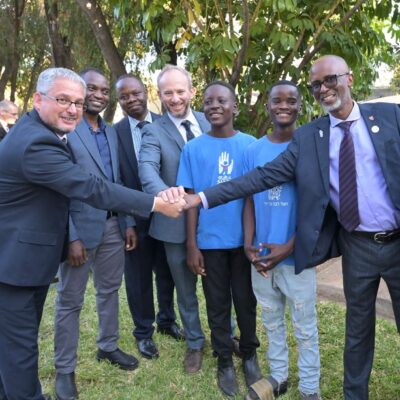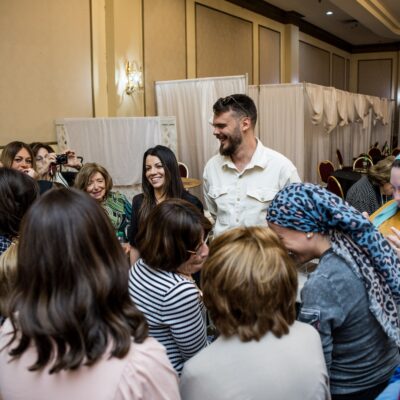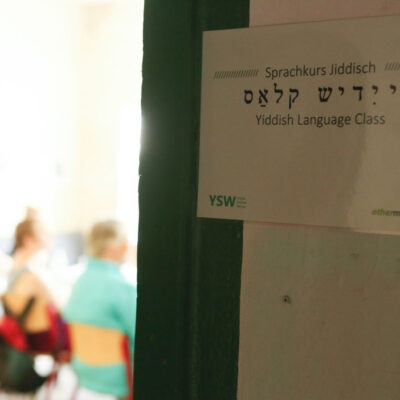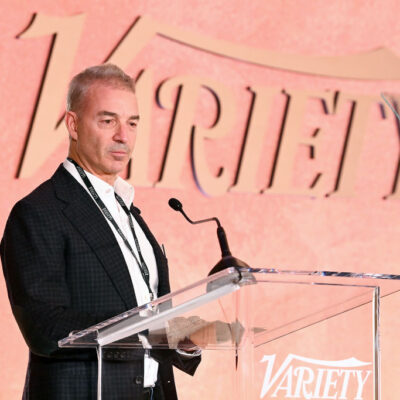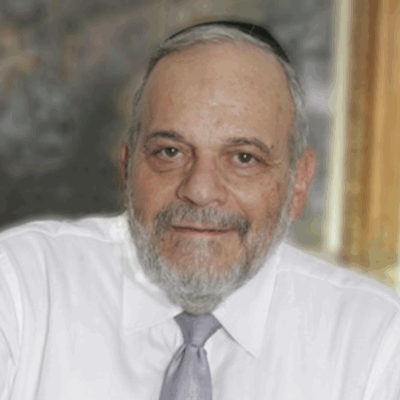As FIDF reels from leaked memo detailing abuses, sources say group’s leaders engaging in deceptive fundraising practices, wasteful spending
The Friends of the Israel Defense Forces has gone into crisis management mode following the leak of an internal investigative report to the Israeli news outlet Ynet last week that detailed serious allegations against the organization’s top leadership, particularly its board chair, Morey Levovitz, of mismanagement, wasteful spending and creating a toxic work environment.
The organization’s board has scheduled a meeting on Thursday to discuss the issues and consider removing Levovitz from his position, sources inside the organization told eJewishPhilanthropy.
This would be the board’s second vote on the matter. Earlier this year, as the allegations first emerged, a vote was held by the board’s executive committee to determine if Levovitz should continue as chair — including Levovitz himself, a departure from the common practice of board members recusing themselves in such cases. The 10 board members who participated were split evenly on the vote, and Levovitz retained his position. Levovitz’s term ends in September, though he has expressed an interest in extending it.
In response to the leak, the organization has hired a crisis communications outfit — on top of its existing public relations firm — and brought on additional legal assistance. It has also issued strict orders to employees and lay leaders not to speak publicly about the situation.
Since the 18-page report was leaked last week, eJP has spoken with several current and former FIDF employees and lay leaders across the United States and Israel to assess its veracity, finding that in addition to the allegations that were included in the report, current and former employees have also raised credible concerns within the organization about dishonest fundraising tactics and the improper handling of sexual harassment claims.
FIDF did not respond to eJP’s questions on the subject, instead issuing a statement in support of Levovitz and CEO Rabbi Steven Weil and stressing the organization’s fundraising efforts on behalf of Israeli soldiers and bereaved military families.
“When you have 60-80 employees saying the same thing, at some point, it can’t not be true,” one former employee told eJP.
In an email to employees earlier this week, the FIDF’s executive committee said it was considering next steps. “Our Board Executive Committee, and the full Board of Directors, are also working to evaluate the findings of the Investigative Committee they created, to make our organization more effective and efficient. We intend to act promptly and swiftly and we will keep you updated as those conversations progress,” the committee wrote.
Multiple sources told eJP that after a significant rise in donations to the organization in the wake of the Oct. 7 terror attacks, contributions have decreased sharply in the past year, with multiple donors explicitly telling FIDF that they were withholding funds because of the situation with upper management.
“They are substantially below their target [for 2025],” one donor source told eJP. “We know of many donors who are holding donations and explaining that it’s until actions are taken to address the problems,” the source said, adding “many, many donors.”
In the Bay Area FIDF chapter, for instance, donations dropped from more than $7 million annually to well below $1 million this year after its popular executive director was fired following a disagreement between her and Levovitz, according to two sources connected to the chapter.
The report, which remains closely guarded by the organization, was prepared this spring by an investigative committee led by board members Garry Sobel, Fred Distenfeld and the organization’s counsel, Steve Rubin. The committee spoke to more than 30 people, the majority of whom were current and former employees.
The committee found that for roughly the past two years — particularly since the Oct. 7 terror attacks — Levovitz has served as the de facto CEO of FIDF, while Weil, the organization’s actual CEO, has served in a lesser administrative capacity, while still drawing one of the highest chief executive salaries in the Jewish world.
According to multiple sources, Levovitz has repeatedly declared to FIDF staff and lay leadership that he is the true head of the organization, including in meetings where Weil was present. Weil has also regularly stated that Levovitz was helping run the organization.
“It has just been accepted that that’s the way it is,” one source said. “He was never elected officially [to serve as CEO].”
The investigative committee detailed a number of irregularities in its report, which was presented to select board members last month, including a highly irregular exclusive agreement between FIDF and the Israeli travel company Ortra, which is run by a close acquaintance of Levovitz, requiring that all of the organization’s missions and other travel be purchased through the firm. This arrangement was allegedly reached unilaterally by Levovitz, without going through a standard tender process. A former senior FIDF employee, who spoke on condition of anonymity, told eJP that when individual FIDF chapters tried to use cheaper alternatives for their missions to Israel, Levovitz intervened and canceled their visits to military bases as a form of punishment for not using Ortra.
The report also found that Levovitz has demanded reimbursement for his travel expenses to Israel, which often include business and first-class seats, amounting to more than $53,000 — in contrast to previous chairs who paid for their own travel and accommodations, in addition to making six-figure donations to the organization, which Levovitz has also reportedly not made.
Though figures within FIDF have been concerned about the direction that the organization was heading for more than a year, they sought to address the issues internally to avoid embroiling FIDF in a public dispute that could damage its reputation and harm its ability to raise money for Israeli soldiers, sources said.
“It’s a beautiful organization for what they do for the IDF, but it’s the wrong people running it,” one source said.
Another source said that they first became alarmed after Levovitz removed Rubin, the organization’s counsel, from FIDF’s executive committee, meaning decisions were being made without the same level of legal oversight. After being pushed out, Rubin eventually left the organization, but was brought back once the national board heard about the matter.
Nearly all of the sources who spoke to eJP requested to speak on condition of anonymity for fear of retribution from FIDF’s upper management. “I’m afraid they will destroy my donor base,” said one former employee, who has since become CEO of another Jewish nonprofit. “These are dangerous, dangerous people.”
Two former employees, from different FIDF regions, told eJP that they had seen cases of the organization “double-selling” projects to donors. “Steve double-sold an amphitheater to another donor,” said the former employee who now leads another nonprofit, whose family also donates to FIDF. “A Florida donor bought the same amphitheater for the same base as us. They told us that we can get a garden instead.”
In another case, she said, her mother-in-law visited an IDF base where they had contributed to a project for which FIDF had raised $40 million. When she mentioned it to the base commander, he was confused, telling her, “Our base only received $12 million.”
“If you sold a project for $40 million, and the base received $12 million, where’s the rest of the money?” she said.
Multiple sources also accused the organization of wasteful spending, both in terms of luxury travel for staff — business-class seats and pricier hotels than those used in the past — and in additional conferences and retreats, including one for staff members in Cyprus.
“Donors think that they are helping soldiers, but Morey created a conference,” one source said. “I would like to see where you have donor consent to create an executive conference.”
All of the sources — coming from three different regions of the United States and Israel, most of whom had been involved with FIDF for many years, some for more than 20 — described a severe deterioration in the work environment at the organization in recent years, using terms like “cutthroat,” “poisonous,” “bullying” and “mafia-like.”
“Everyone thinks they are the next one to be fired,” one said.
Another source, a former employee, told eJP that she had been sexually harassed by her former supervisor at FIDF, which she reported to human resources.
“It was never addressed,” she said. “He eventually left the organization [on his own], but he would still come back to FIDF offices and make threatening comments.”
When she reported that to HR as well, “I was told, ‘He doesn’t work here anymore, so he’s not our problem,’” she said.
The former employee said that she related this to the investigative committee, which did not include it in its report to the board because the focus was on “business” issues. She added that she was aware of several other women who also experienced sexual harassment at FIDF, but whose testimonies were not included in the final report.
Multiple sources told eJP that over the past two years, there has been a growing rift between FIDF’s upper management and the organization’s Israeli-born staff and lay leadership. One source estimated that of the more than two dozen FIDF employees who have been fired over the past two years, “80% of [them] happen to speak Hebrew very well.”
“I can only suspect that Israelis maybe ask more questions than Americans when it comes to identifying things that are not kosher, and Morey didn’t like that. He doesn’t like to be challenged,” the source said.
Ofer Mazuz, who served as an Israel-based contractor for FIDF, overseeing its infrastructure projects, told eJP that his contract was terminated after he discovered that the organization had made a mistake in a filing.
“I had been there for 12 years,” Mazuz said. “I found a mistake. A big mistake, but a mistake that could be fixed. They said you are out, so I left. They fired me without saying a word.” (Mazuz stressed that while he is aware of allegations of impropriety at FIDF, the issue that he found was not illicit or an intentional deception.)
“The first 10 years that I was there were pleasant,” he said. “The organization was amazing. What is happening there now is crazy; they’re firing people left and right without any logic.”
This internal turmoil comes as FIDF faces wider criticism over the limitations of what it does and — more importantly — does not provide funding for, namely tactical equipment directly to soldiers. This has come up regularly since the Oct. 7 terror attacks, with the call-up of hundreds of thousands of reserve troops, many of whom complained of equipment shortages and addressed them through crowdfunding and grassroots campaigns.
Multiple sources tied the current turmoil in the organization to a 2020 decision spearheaded by then-board Chair Peter Weintraub to split the professional leadership of the organization into two. FIDF had historically been led by a former Israeli general, but then the board decided to hire Weil, a former pulpit rabbi and executive vice president from the Orthodox Union, to serve as CEO, while also bringing on board a former general to serve as national director. (The organization recently created an executive vice president position as well.)
“Why do we need so many executives?” an FIDF regional board member said. “There are just way too many people at high levels.”
During his interviews with the board, Weil noted that he did not have experience as a CEO, and after he was hired, he brought Levovitz onto the board to assist him. The two had known each other for nearly 20 years at that point through the Beth Jacob synagogue in Beverly Hills, Calif., and various local Jewish organizations.
In 2023, Levovitz was named board chair. A regional FIDF board member said that Levovitz began acting as the CEO soon after the Oct. 7 terror attacks, declaring in a meeting a few days later, “I am the one in charge; Steve is not really capable.”
“We were all heartbroken and shocked by what happened in Israel, so our focus was not on who is joining the organization or not,” she said. “We did argue and didn’t quite understand where it was coming from. But in normal circumstances, this would not have passed.”
A former FIDF employee told eJP that the influx of funding in the wake of the attacks — in 2023, the organizations raised $282 million, more than three times what it did the year before — was used by Levovitz and Weil to fend off criticism.
“It was because of the war, not because of their leadership,” she said.


